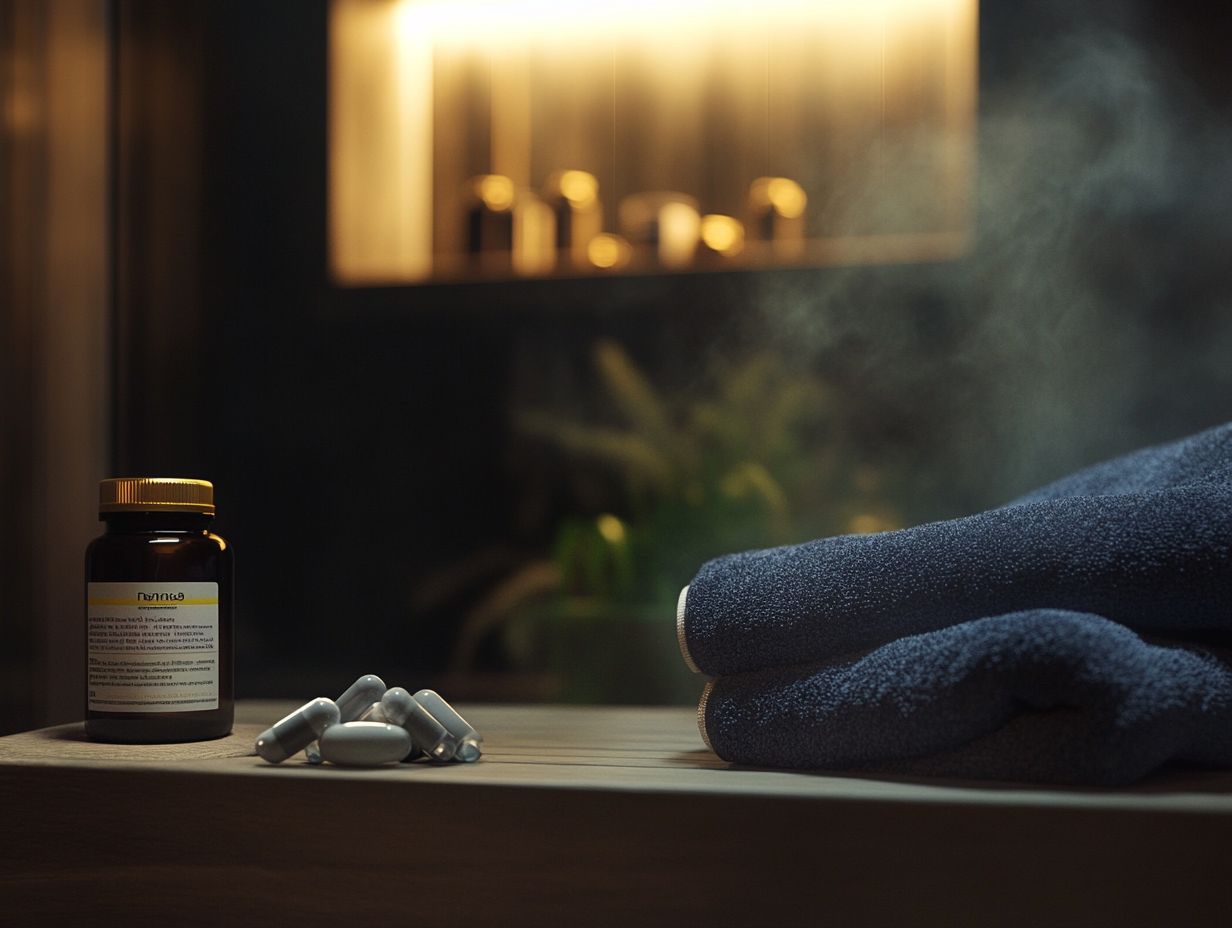Can I Use a Sauna While on Medication?
If you find pleasure in the calming warmth of a sauna, you may be curious about how it interacts with any medications you re currently taking.
This article delves into the intricacies of sauna usage, explaining what a sauna is and how it can impact your health when combined with certain medications. It highlights potential risks, identifies specific medications that could lead to complications, and underscores the importance of consulting with your doctor.
If saunas are not right for you, we will suggest alternative relaxation methods.
Read on to ensure your wellness journey remains both safe and effective.
Contents
- Key Takeaways:
- Understanding Saunas and Medication
- Risks of Using a Sauna While on Medication
- Types of Medication That May Be Affected
- Consulting with a Doctor Before Using a Sauna
- Alternative Options for Relaxation and Detoxification
- Frequently Asked Questions
- Can I Use a Sauna While on Medication?
- What types of medications should I be cautious about when using a sauna?
- Are there any potential side effects of using a sauna while on medication?
- Can I still use a sauna if my doctor has approved me to take my medication while exercising, especially considering sauna risks?
- How long should I wait after taking my medication before using a sauna?
- Are there any alternative ways to reap the benefits of a sauna while on medication?
Key Takeaways:
Here are some important points to remember:
- Using a sauna while on medication can have potential risks and complications.
- Certain types of medication can interact with saunas and cause adverse effects.
- Always consult with a doctor before using a sauna while on medication.
Understanding Saunas and Medication
Knowing how saunas and medications interact is crucial for your safety and well-being. Saunas, especially the traditional Finnish sauna known for its dry heat and heated stones, create a unique environment that enhances relaxation and promotes wellness.
Be aware of how different medications can affect your sauna experience, particularly concerning heart issues, cognitive issues, and other health conditions. Being well-informed about sauna usage is essential, especially for the elderly, pregnant women, and children. For parents, knowing how to teach kids about sauna safety and maintenance can help ensure a safe and enjoyable sauna experience.
What is a Sauna?
A sauna is a cozy haven crafted to encourage sweating and relaxation through dry heat, a tradition deeply rooted in Finnish culture. It often features heated stones that add to the experience and promote detoxification.
For centuries, saunas have been woven into the social tapestry of Finland, serving not only as retreat spaces for relaxation but also as venues for significant life events, from births to cleansing rituals. The design and types of saunas have evolved over time, with variations like the smoke sauna and infrared sauna each offering distinct experiences that cater to different preferences, including musculoskeletal disorders.
In a traditional sauna, the mechanics are simple yet effective: heated air warms your body, prompting a satisfying sweat. Some saunas can reach temperatures as high as 195 F, while others offer milder environments, allowing you to select the heat level that suits you best. This ability to fine-tune your sauna experience enhances the therapeutic benefits, contributing significantly to your overall well-being and stress relief. If you have children, it’s crucial to be aware of how to keep them safe; you can find valuable tips in this guide on how to keep children safe in a sauna.
How Medication Can Interact with Saunas
Understanding how medication interacts with saunas is essential for anyone looking to enjoy sauna therapy without jeopardizing their health and lung function.
You might not realize how certain treatments, especially antibiotics, can change your body’s response to heat. For example, some antibiotics can make you more sensitive to temperatures, which could lead to adverse reactions during your sauna sessions. If you have heart issues or respiratory issues, the risks can be even higher, as your body has to work overtime to regulate temperature in those extreme conditions. Additionally, it’s important to consider if children can use a sauna as their bodies may react differently to heat exposure.
Always prioritize your health before stepping into a sauna! It’s crucial for sauna enthusiasts like you to be aware of these risks and consult healthcare professionals to determine the safest practices. For families, understanding sauna safety for children and adolescents is vital. This way, you can ensure a therapeutic experience that aligns perfectly with your medical needs.
Risks of Using a Sauna While on Medication

Utilizing a sauna while on medication can introduce several risks, especially regarding dehydration, fluctuations in heart rate, and the potential worsening of specific health conditions. It s essential to approach this combination with caution and mindfulness, particularly when considering alcohol consumption.
Possible Side Effects and Complications
Engaging in sauna bathing while on certain medications can lead to a range of side effects and complications, such as dehydration and heightened heart issues, particularly in those with chronic tension and headache disorders.
For individuals dealing with chronic tension and headache disorders, the impact of sauna exposure can be especially significant. While the heat might offer temporary relief from muscle tightness, it can worsen underlying conditions, including psoriasis, if you don’t take the right precautions. It’s crucial to understand sauna safety and the importance of supervision when using a sauna.
It’s essential to maintain adequate hydration before, during, and after sauna sessions. Dehydration can amplify headache symptoms and lead to increased discomfort. If you have pre-existing heart conditions or heat sensitivity, be extra cautious.
Paying close attention to how your body responds to the heat is key. This way, you can ensure that your sauna experience remains therapeutic, rather than veering into discomfort.
Types of Medication That May Be Affected
Certain medications may react quite differently when exposed to the high temperatures of a sauna. Consider your health and how your body controls heat carefully before stepping into one.
Common Medications That Can Interact with Saunas
Common medications, including antibiotics and heart medications, can create complications when paired with sauna usage, particularly concerning blood pressure. Staying informed is essential.
Take beta-blockers for example. These are frequently prescribed for hypertension and can disrupt your body’s ability to manage heat. This disruption can heighten the risk of heat exhaustion and severe heart issues for those who enjoy sauna sessions. To ensure safety, it’s important to follow sauna safety guidelines for family use.
If you’re using respiratory medications like bronchodilators, tread carefully; the heat from the sauna may affect how those medications operate. Diuretics, often prescribed for chronic conditions, can worsen dehydration in intense heat and may be particularly concerning for pregnant women. If you’re wondering about the safety of sauna use during pregnancy, check out can you use a sauna while pregnant?
Understanding the implications of sauna therapy while on these medications is vital for your safety and the overall effectiveness of your treatment. It’s especially important to know if it is safe to use a sauna when sick, particularly for those with lung function concerns.
Consulting with a Doctor Before Using a Sauna

Consulting with a doctor before using a sauna is a wise decision, especially for those with pre-existing health conditions or individuals taking medication. This proactive approach ensures that you prioritize your well-being and make informed choices about your health and sauna guidelines.
Precautions and Recommendations
Taking the right precautions and following expert recommendations is crucial for a safe sauna experience, especially if you have specific health conditions and are considering alcohol consumption.
Hydration
Stay hydrated by drinking ample water before, during, and after your sauna session to stave off dehydration. Keeping an eye on your heart rate throughout the experience can help you stay attuned to your cardiovascular response, especially if you are on medication.
Session Duration
For older adults, shorter sessions are wise to reduce the risk of overheating. If you’re pregnant, check in with your healthcare provider to understand if sauna use is appropriate for your situation and to ensure sauna safety.
Children
Children should only enjoy saunas under adult supervision and for limited durations to ensure their sauna safety and well-being.
Alternative Options for Relaxation and Detoxification
If you find yourself unable to use saunas due to health conditions or potential medication interactions, exploring alternative options for relaxation and detoxification can be quite advantageous.
Explore alternative relaxation methods today!
Exploring Sauna Alternatives
Exploring sauna alternatives can offer you effective relaxation and removing toxins without the risks that some individuals face with traditional sauna therapy, thereby enhancing your wellness experience.
If you struggle with high temperatures or have specific health conditions, consider steam baths. They offer gentler heat while still promoting sweating.
Hot tubs also serve as a soothing alternative, allowing you to immerse yourself in warm water that alleviates muscle tightness and enhances circulation while providing stress relief.
Meditation and yoga can boost your mental clarity, fostering mindfulness and reducing stress. It s essential to consider your unique health needs when selecting from these alternatives, ensuring you choose the option that best supports your overall wellness and health benefits.
Frequently Asked Questions

Can I Use a Sauna While on Medication?
It’s best to avoid using a sauna while on medication, as the high heat and steam can interact with certain medications and potentially cause negative effects, including complications.
What types of medications should I be cautious about when using a sauna?
Medications that can affect your heart rate, blood pressure, or ability to sweat should be used with caution. Examples include beta blockers, diuretics, and antihistamines.
Are there any potential side effects of using a sauna while on medication?
Yes, using a sauna while on certain medications can increase your risk for dehydration, heat stroke, and other serious side effects. Be sure to talk to your doctor first before using a sauna with your medication.
Can I still use a sauna if my doctor has approved me to take my medication while exercising, especially considering sauna risks?
It’s important to follow your doctor’s specific instructions and recommendations. If your doctor has approved you to take your medication while exercising, then it may be safe for you to use a sauna. However, monitor your body’s response and speak with your doctor if you experience any discomfort.
How long should I wait after taking my medication before using a sauna?
It is recommended to wait at least 1-2 hours after taking your medication before using a sauna. This allows enough time for the medication to be fully absorbed and for any potential side effects to subside before exposing your body to the high heat and steam of a sauna.
Are there any alternative ways to reap the benefits of a sauna while on medication?
Yes! You can experience the benefits of a sauna without actually using one. Consider options like a steam room or a warm bath with Epsom salts, both of which provide similar effects without the potential risks of using a sauna while on medication.
Don’t miss out! Share your experiences or seek professional advice regarding sauna use and health.






